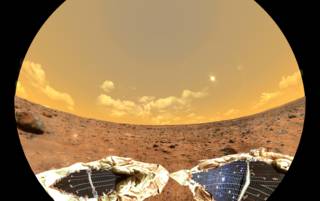Soil Science Society of America
5585 Guilford Road • Madison, WI 53711-5801 • 608-273-8080 • Fax 608-273-2021
www.soils.org
Twitter | Facebook
NEWS RELEASE
Contact: Hanna Jeske, Associate Director of Marketing and Brand Strategy, 608-268-3972, hjeske@sciencesocieties.org
Farming on Mars? The Martian raises questions about soil
Oct. 29, 2015—In the recent sci-fi hit, The Martian, the main character, astronaut Mark Watney (played by Matt Damon), manages to grow potatoes on the planet with a mix of ingenuity, science, and a bit of Hollywood make-believe. Could it work?
“The theories behind what [The Martian author] Andy Weir wrote in his book are sound,” says Jim Bell, a planetary scientist at Arizona State University. “A good soil for growing crops will have structure to hold the plant up, and provide the nutrients needed for growth. This is where Watney was headed in his ‘soil recipe.’ Of course, he had to use only the resources with him on the planet.”
 In the movie, Watney mixes Mars soil with some of his freeze-dried feces (with apologies to the weak-stomached in the audience). According to soil microbiologist Mary Stromberger, Colorado State University, “In theory, Watney’s waste would provide nutrients for growing plants. In reality, the Mars ‘soil mixture’ he made doesn’t have the complex food web of microbes that we have on Earth. So, there might be some issues with the recycling of nutrients between soil and plants and atmosphere. And, we don’t know if the fecal bacteria could thrive on Mars, even in a controlled environment….On the other hand, he had to use what was there, and this is a sci-fi movie!”
In the movie, Watney mixes Mars soil with some of his freeze-dried feces (with apologies to the weak-stomached in the audience). According to soil microbiologist Mary Stromberger, Colorado State University, “In theory, Watney’s waste would provide nutrients for growing plants. In reality, the Mars ‘soil mixture’ he made doesn’t have the complex food web of microbes that we have on Earth. So, there might be some issues with the recycling of nutrients between soil and plants and atmosphere. And, we don’t know if the fecal bacteria could thrive on Mars, even in a controlled environment….On the other hand, he had to use what was there, and this is a sci-fi movie!”
In the book, Watney took other steps, such as fertilizing and amending soil, which were not included in the movie. “You can only include so much information in a movie lasting a little over two hours,” says Bell.
“The soil science community has defined soils to exist only on planet Earth, because the presence of life is critical” says Harold van Es, Cornell University. “We need to start thinking about soils on other planets. That’s why, as part of our International Year of Soils celebration, the Soil Science Society of America invited Jim Bell to discuss this topic.”
Bell will present a lecture titled “Soils of Mars: Keys to Understanding the Habitability of the Red Planet” at SSSA’s annual meeting on Nov. 18, 2015. To learn more about that lecture, visit https://www.soils.org/newsroom/releases/2015/1005/707/.
The United Nations declared 2015 the International Year of Soils to bring attention to soils as a diminishing and important natural resource. SSSA developed educational materials and videos surrounding twelve monthly topics, found at www.soils.org/iys. Topics range from “Soils Sustain Life” and “Soils Support Agriculture” to “Soils and Climate” and “Soils Are Living.”